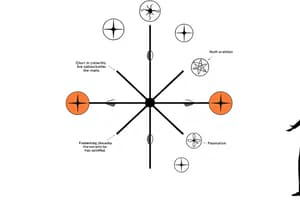Podcast
Questions and Answers
What is a key characteristic that a hypothesis must have?
What is a key characteristic that a hypothesis must have?
- It must be unfalsifiable.
- It must be based solely on common sense.
- It must be derived from personal intuition.
- It must be falsifiable. (correct)
What does descriptive research primarily allow researchers to answer?
What does descriptive research primarily allow researchers to answer?
- The underlying causes of behaviors.
- Why certain phenomena occur.
- What, when, where, and how questions. (correct)
- Predictive outcomes of experiments.
Which of the following best describes the first step in the scientific method?
Which of the following best describes the first step in the scientific method?
- Analyzing data.
- Identifying the research problem. (correct)
- Conducting an experiment.
- Developing a conclusion.
What is a potential disadvantage of conducting a case study?
What is a potential disadvantage of conducting a case study?
In the scientific method, what follows after designing and conducting an experiment?
In the scientific method, what follows after designing and conducting an experiment?
What is the definition of psychology?
What is the definition of psychology?
Intuition is a reliable way to understand the natural world.
Intuition is a reliable way to understand the natural world.
According to Kant, what is necessary for understanding?
According to Kant, what is necessary for understanding?
The scientific method must be ______.
The scientific method must be ______.
What do descriptive research methods allow us to do?
What do descriptive research methods allow us to do?
A case study involves the in-depth study of a ______.
A case study involves the in-depth study of a ______.
Case studies allow researchers to generalize findings to the larger population.
Case studies allow researchers to generalize findings to the larger population.
What is the purpose of a survey in research?
What is the purpose of a survey in research?
What sampling method ensures that every person has an equal chance of selection?
What sampling method ensures that every person has an equal chance of selection?
Naturalistic observation takes place in a laboratory setting.
Naturalistic observation takes place in a laboratory setting.
What is a fundamental rule of naturalistic observation?
What is a fundamental rule of naturalistic observation?
Flashcards are hidden until you start studying
Study Notes
Lecture 1: Methods - Introduction
- Copyright Notice: Lecture notes prepared by the instructor are copyrighted and cannot be shared or distributed online or offline.
- Bullet Points (BPs): These notes provide a framework for taking notes during lectures. They outline the sections and concepts covered in each lecture.
- Purpose of Science:
- Often contradicts intuition and common sense.
- Helps overcome overconfidence in our own knowledge.
- How Do We Know?:
- Rationalism: Emphasis on logic and reason to acquire knowledge.
- Empiricism: Knowledge gained through sensory experience and observation.
- Kant: Argued for a synthesis of rationalism and empiricism, suggesting that both are necessary for true understanding.
- The Scientific Method: A systematic approach to understanding the world.
- Steps:
- Identify a phenomenon or question.
- Gather information through research.
- Develop a hypothesis (a testable prediction).
- Design and conduct experiments or studies.
- Analyze data and draw conclusions.
- Restart the process with new questions based on findings.
- Hypothesis: A testable statement that proposes a relationship between variables.
- Must be falsifiable: Meaning it can be tested and potentially proven wrong.
- Requires replication: The ability for others to repeat the experiment and achieve similar results.
- Evolution: The scientific method is constantly refined and improved through ongoing research and experimentation.
- Steps:
Types of Research Methods
- Descriptive Research: Focuses on describing phenomena as they occur.
- Purpose:
- Provides a detailed account of a particular event, situation, or group.
- Helps us answer questions about "what," "when," "where," and "how."
- Limitations:
- Does not explain why things happen or provide causal relationships.
- Purpose:
- Case Study: An in-depth study of a single individual, group, or event.
- Definition: A method involving detailed and systematic observation and analysis of a specific subject.
- Advantages:
- Permits detailed examination of a complex phenomenon.
- Allows for observation and recording of behavior patterns.
- Provides valuable insights for future research.
- Disadvantages:
- Researcher bias can influence findings.
- Limited generalizability: Findings may not apply to other situations.
- Cannot establish cause-and-effect relationships.
Psychology as a Science
- Psychology is the scientific study of how we think, feel, and behave.
- Psychology is a vast field, as it encompasses every aspect of human life.
Why Science is Necessary
- Intuition is unreliable for understanding the natural world.
- Common sense is subjective and does not offer new knowledge about the world.
- Humans often overestimate their knowledge and understanding.
The Role of Rationalism and Empiricism in Knowledge
- Rationalism suggests using reason and logic to understand the world.
- Empiricism emphasizes the importance of direct observation and experience.
- Kant argued that both rationalism and empiricism are essential for gaining knowledge.
Steps of the Scientific Method
- Identify the problem
- Gather information
- Develop a testable hypothesis
- Design and conduct an experiment or other research study.
- Analyze the data and draw conclusions
- Repeat the process
Types of Research Methods
Descriptive Research
- Aims to systematically and objectively describe observations.
- Answers “what,” “when,” “where,” and “how” questions.
- Cannot establish cause-and-effect relationships.
Case Study
- In-depth study of a single individual or a small group.
- Useful for documenting rare events and complex phenomena.
- Provides in-depth understanding but cannot be generalized to larger populations due to small sample size.
Survey
- Asks a large sample of people questions to gather information.
- Relies on representative samples to generalize findings to the population.
- Employ random sampling techniques to ensure equal chance of inclusion for every individual.
- Simple random sample: Selects individuals randomly from the population.
- Stratified random sample: Divides the population into groups and randomly selects individuals from each group.
Naturalistic Observation
- Researchers observe participants in their natural environment.
- Prevents interference by the researcher.
- Provides realistic insights and can lead to discoveries not possible in controlled settings.
Studying That Suits You
Use AI to generate personalized quizzes and flashcards to suit your learning preferences.





